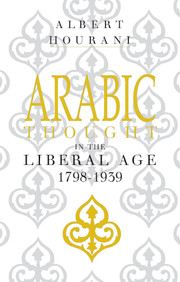Book contents
- Frontmatter
- Contents
- Preface to the 1983 reissue
- Note on Transliteration and References
- I THE ISLAMIC STATE
- II THE OTTOMAN EMPIRE
- III FIRST VIEWS OF EUROPE
- IV THE FIRST GENERATION: TAHTAWI, KHAYR AL-DIN, AND BUSTANI
- V JAMAL AL-DIN AL-AFGHANI
- VI MUHAMMAD ‘ABDUH
- VII ‘ABDUH'S EGYPTIAN DISCIPLES: ISLAM AND MODERN CIVILIZATION
- VIII EGYPTIAN NATIONALISM
- IX RASHID RIDA
- X CHRISTIAN SECULARISTS: SHUMAYYIL AND ANTUN
- XI ARAB NATIONALISM
- XII TAHA HUSAYN
- XIII EPILOGUE: PAST AND FUTURE
- Select Bibliography
- Index
- Frontmatter
- Contents
- Preface to the 1983 reissue
- Note on Transliteration and References
- I THE ISLAMIC STATE
- II THE OTTOMAN EMPIRE
- III FIRST VIEWS OF EUROPE
- IV THE FIRST GENERATION: TAHTAWI, KHAYR AL-DIN, AND BUSTANI
- V JAMAL AL-DIN AL-AFGHANI
- VI MUHAMMAD ‘ABDUH
- VII ‘ABDUH'S EGYPTIAN DISCIPLES: ISLAM AND MODERN CIVILIZATION
- VIII EGYPTIAN NATIONALISM
- IX RASHID RIDA
- X CHRISTIAN SECULARISTS: SHUMAYYIL AND ANTUN
- XI ARAB NATIONALISM
- XII TAHA HUSAYN
- XIII EPILOGUE: PAST AND FUTURE
- Select Bibliography
- Index
Summary
Ideas such as those of ‘Abduh were ‘in the air’ in the last quarter of the nineteenth century. We find similar groups of reformers in all the more advanced of the Muslim countries, and perhaps it is too simple to explain them in terms of the influence of al-Afghani and ‘Abduh. It could be said, as an alternative, that al-'Urwa al-wuthqa could only have had its influence because there were already little groups of Muslims thinking on the lines which it made popular. In Tunis such a group existed among the associates and followers of Khayr al-Din: in particular, there was Muhammad Bayram, one of a line of religious scholars, who wrote a number of works on reform of the law, as well as an important history of his age. In Baghdad there were the scholars of the Alusi family, one of whom wrote a vast commentary on the Quran, a judicious summary of the traditional learning, while another, a generation younger, wrote a defence of Ibn Taymiyya against charges of unorthodoxy—a sign of the influence which such ideas were now beginning to exercise over educated Muslims of a different tradition. In Syria similar men can be found in all the great centres of Muslim learning, Aleppo, Damascus, Tripoli, and Jerusalem. Among those who were roughly contemporary with ‘Abduh, and had some contact with him, was Tahir al-Jaza'iri (1851–1920).
- Type
- Chapter
- Information
- Arabic Thought in the Liberal Age 1798–1939 , pp. 222 - 244Publisher: Cambridge University PressPrint publication year: 1983

